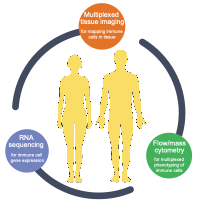Ayoglu Lab

Immunology is a central field intersecting with multiple areas of biomedical science, from management of infectious diseases to treatment of chronic diseases such as cancer. In recent years, it also become clear that immune responses are key to the development of many common disorders not traditionally viewed as immunological, including various neurodegenerative and metabolic conditions. This comes as no surprise: The immune system is not a system isolated within itself. It rather communicates closely with other normally functioning physiological systems, as well as dysregulated tissues such as tumors.
Immune processes are mediated by the crosstalk between several types of cells, both circulating as well as tissue-resident ones. These immune cells are interacting in micro-environmental contexts and build networks to communicate with the local tissue. In order to identify the cell types, features, and mechanisms suited to generate new treatments and diagnostic tools, there is a critical need for development and application of multi-parametric tools allowing for a comprehensive characterization of the immune system cells both at a single-cell, and at a system level across various tissue types and organs. The goal of our research is to develop and apply methods for building high-parametric, single-cell resolution proteomic and transcriptomic maps of tissue immune cell landscape in health and disease. For this purpose, we use tools such as multiplexed tissue imaging platforms, flow and mass cytometry and single-cell RNA sequencing.
We are driven to explore basic questions in immunology, such as whether there are any sex-specific features in the normal tissue immune microenvironment and what types of tissue resident immune cells in different organs co-express sex steroid hormone receptors, thus potentially influencing differential vulnerability to inflammation between males and females. Studies dedicated to address these questions are key towards understanding the remarkable differences observed between male and female predisposition to various diseases, such as autoimmune diseases being biased towards women, and men being more susceptible to viral, bacterial and parasitic infections. We believe that exploration of these basic aspects in human immunology have also clinical and translational implications far beyond immunology: They build the foundation e.g. to manage sex-specific graft rejection rates in organ transplantations or sex-based differences in response and resistance to immune checkpoint inhibitors in cancer therapies.
